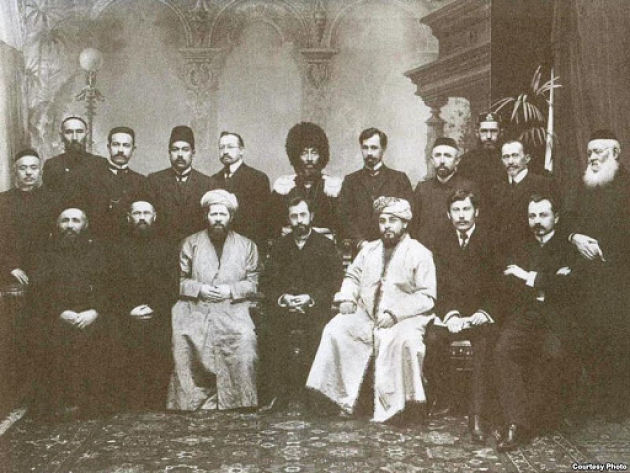Harsh statements in connection with the events in France by a number of well-known individuals who are perceived in Russian society as the voice of the country’s Muslims have led a number of political commentators to talk about the inevitable emergence of an Islamic party in Russia. Let’s try to think about if and when this is possible, and what kind of party it might be.
Let’s start with these rumors themselves, which were presented in such a way that Ramzan Kadyrov would lead such an “Islamic party”. Let’s not talk about him right now and immediately answer these rumors – no, it is not possible, because the Kremlin will not allow it, and Ramzan Kadyrov will not go against it, at least not while Vladimir Putin is in power.
Ten years ago, a much more realistic idea was already being discussed – the creation of a Muslim faction within United Russia led by Ramzan Kadyrov, in parallel with the unification of all major Muslim spiritual organizations that would recognize him as their leader. Opponents of both Ramzan Kadyrov and the Muslim spiritual organizations themselves greeted these rumors with outrage as an attempt by the authorities to take control of the Islamic factor. But they also faced outrage in pro-government circles and within the government itself, especially from those associated with the Russian Orthodox Church. In the end, Ramzan Kadyrov distanced himself from such initiatives, and their authors faced serious problems.
This is understandable, because even then the state authorities perceived Muslims as an element that should be fragmented and subordinated to them, rather than consolidated and independent. Over the past decade, religious subordination within the authorities has been finally established, with the Russian Orthodox Church becoming an analog of the ideological departments of the Communist Party of the Soviet Union at the all-Russian and most regional levels. Thus, as long as this system remains in place, there is no chance that Muslims will be allowed to create even their own parallel “department” within the ruling party, let alone their own party in a de facto one-party state where such opportunities are denied to independent liberals, independent leftists, independent nationalists, etc. The first independent Muslim party in the USSR – the Islamic Renaissance Party – appeared only when the monopoly of power of the Communist Party of the Soviet Union was eliminated, that is, during the period of perestroika, when opposition parties and parliamentary factions of various orientations began to emerge. And this is the answer to the question of when such a party could emerge – no earlier than the dismantling of the current regime of party-religious monopoly and the emergence of real political competition.
But what kind of successful party could Muslims have in Russia? And here we must begin with the name itself. If an Islamic party means a party that serves the interests of Islam and Muslims, then such a party theoretically (!) has a chance in a country where millions of Muslims live. But if it is a party that openly calls itself Islamic, and thus opposes itself to all non-Muslim voters, and repels those Muslims (of varying degrees of awareness) who are afraid of the excesses of Sharia law, then such a party will have minimal chances even under conditions of free political competition.
For this reason, many modern successful parties that effectively represent the interests of Muslims do not call themselves Islamic – such as the Justice and Development Party in Turkey and its namesake in Morocco, the Renaissance Party in Tunisia, and the Democratic Action Party in Bosnia. Although these parties have their roots in openly Islamic movements, they themselves were created not as religious but as national parties, appealing to both practicing Muslims and secular voters.
In 2011, one of Russia’s leading Muslim publicists, Abdul Rinat Mukhametov, attempted to formulate a possible political platform for such a party in Russia, defining it as “social federalism.” And a year later, Harun Vadim Sidorov wrote about how such a party could relate to the Islamic sector of civil society: “…even the most well-constructed pro-Muslim party will not be able to solve the task of mobilizing Muslim votes alone. For the simple reason that neither the leaders nor the structures of such a party will have the necessary authority and mechanisms to mobilize Muslim votes. If we consider the “ideological” part of Russian Muslims, their mobilization is possible either through mosques or through informal religious communication environments: jamats, tariqats, Islamic centers, communities on social networks, etc.. And the opinion leaders for them will not be the heads of regional party branches, but the Islamic leaders who possess real authority: imams, sheikhs, amirs, preachers, etc.”.
It should be noted that such an attempt at political mobilization of Muslims was made in the past by the Union of Muslims of Russia, which emerged after the unsuccessful attempt to create the Islamic Renaissance Party of Russia. However, a nationwide party that could not only receive the votes of the Muslim electorate, but also make a pact with their representatives, including them in its lists, and at the same time be able to mobilize the non-Muslim electorate, has not yet appeared.
Thus, if we talk about the sequence of promoting the Muslim political agenda in Russia, it seems to be as follows: 1) changing the political regime to one that allows free political competition, including the participation of Muslims; 2) creating structures for the political mobilization of the Islamic sector of civil society; 3) creating nationwide and regional parties complementary to Islam and Muslims, through which their tasks would be addressed.
(In the photo – members of the Muslim faction in the State Duma of the Russian Empire)

